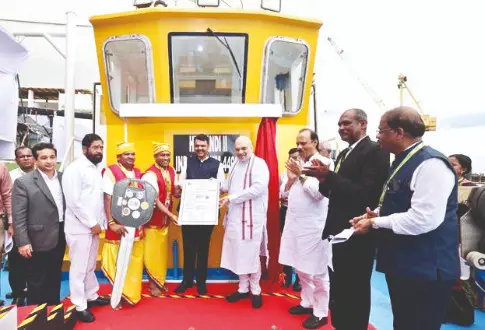‘Matsya Sampada Yojana’: Shah unveils deep-sea fishing vessels

MUMBAI: Union Home and Cooperation minister Amit Shah inaugurated deep sea fishing vessels under the Pradhan Mantri Matsya Sampada Yojana at Mazgaon Dock in Mumbai on Monday. The ceremony was a milestone in the process of modernizing India’s marine fisheries industry and cooperative-led coastal area development. Maharashtra Chief Minister Devendra Fadnavis, Deputy Chief Ministers Eknath Shinde and Ajit Pawar, and Union Minister of State for Cooperation Murlidhar Mohol were present on the occasion.
Speaking in his address, Shah stated that on the guidance of Prime Minister Narendra Modi, the initiative represents the willingness of the government to make the vision of Aatmanirbhar Bharat a reality and build a stronger blue economy with the help of the cooperative movement. He pointed out that the two trawlers being launched today will enormously augment India’s ability to tap its oceanic resources while ensuring the fishery profits reach the house of hardworking fishermen directly through cooperative ownership.
Describing the model, Shah explained that previously, a majority of fishing trawlers had been working on a salary-based model of employment. But with cooperative-based fishing, all fishermen will now be getting a share of profits. In the first phase, 14 trawlers will be made available and later the fleet will be increased further through cooperative efforts between the Ministry of Cooperation and the Department of Fisheries. Each trawler can sail in deep seas for as long as 25 days and transport 20 tonnes of fish, with living and dining quarters. Large ships will oversee logistics and bring the catch ashore.
Shah made the announcement that a holistic scheme for fishermen along India’s 11,000-km coastline is being conceptualized to make them more economically well off. He said that national prosperity cannot be defined in terms of GDP but needs to be understood in a human development perspective—where each home is independent and equipped to give education, nutrition, and healthcare.
He added that India’s economic model should be based on cooperation, in dairy, agriculture, or fisheries, so that the benefits trickle down to the grassroots. Pointing to examples, Shah explained how sugar cooperatives of Maharashtra and Amul network of Gujarat have revolutionised rural economies. He observed that the Rs 80,000 crore annual business of Amul empowers millions of women, showing what cooperative enterprise can achieve.
The Home minister also highlighted the unprecedented development of India’s fishery sector during the Modi government. Overall fisheries production has almost doubled from 102 lakh tonnes in 2014-15 to 195 lakh tonnes, with freshwater fisheries going up by 119 percent and marine fisheries by 37 percent.
He concluded by reiterating that cooperatives are the strongest tool to drive inclusive economic growth and that the government will continue to empower fishermen through sustainable, cooperative-led development of India’s blue economy.



